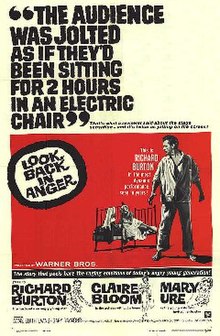Almost
once in a lifetime people tend to question themselves what has happened to the
world they used to know and to that life they wanted to live. This mostly
happens when you are getting old or a lot of changes have reshaped the reality
you used to live in or when you feel stuck in life. So how is someone supposed
to react to this fact that cannot be run away from? With anger seems to be the
answer given by Osborne in his play “Look back in anger” (1956), where Jimmy
feels nothing but frustrated and irritated and decides to show his emotions by
being angry with life. But why? Can a situation be so terrible that the only
way of facing it is through anger?
During
the 1950’s the post-Second World War England, unlike The United States of
America, was going through a crisis as a nation since its time of glory had
passed. Many citizens felt that something had died in the country and in
themselves as well, but no one was brave enough to realize what it was.
Literature has worked as a means of expression for artists to depict some of
the issues that concern society in a certain period. However, for the time
being, English playwrights did not seem eager to show what the reality of the
country- and more importantly of the lower classes- was. That was until Osborne
chose to deal in one of his literary works with this theme and to express his disaffection
towards a country that was not giving assistance to the ones who need it.
In
Look back in Anger, Jimmy questions the newspapers, his wife’s lack of reaction
to the situations lived in their house, and his friend’s lack of interest on
what surrounds him. Jimmy finds it difficult to feel excited and no one really
understands him because no one has suffered as he has. Everything is still
the same as it was before the War, but to him it seems so evident that they are
living in a status quo. He even ironizes: “Why don't we have a little
game? Let's pretend that we're human beings, and that we're actually alive.”
(Osborne, 1956). By and large, Osborne is only sharing his concerns
through Jimmy’s eyes.
If
on the one hand we have Jimmy angry because nothing has changed and his dreams
cannot be achieved, on the other hand we have Alisson’s father who seems to be
nostalgic about the time he spent in India, where he was delightful, however,
now he knows that times will not come back and wishes nothing had ever changed.
Allison smartly said to his father “You're hurt because everything is
changed. Jimmy is hurt because everything is the same. And neither of you can
face it. Something's gone wrong somewhere, hasn't it?” (Osborne, 1956).
But wait… he did not react with anger… Maybe because he had already felt on the
top of the mountain and discovered how wonderful life could be when you have
the opportunity to experience what you want to; unlike Jimmy who live in the
uncertainty of what could be like to be able to actually reach what you aim at,
if given the opportunity…
“Enid:
Look, I didn’t say you couldn’t come with me… Ii just feel weird about it… You
can still come…
Rebecca:
Well, maybe I don’t! I don’t want to go anywhere or do anything… I just want it
to be like it was in high school!” (Clowes, 1998)
So,
is it anger the final answer? Maybe it is, or maybe not. You can only know how
your reaction is going to be once experiencing frustration, and feeling like
the characters in these two workarts felt.
References
Clowes,
D. (1998). Ghost World. Canada:
Thompson Groth.
Osborne,
J. (1957). Look back in anger.
New York: Criterion Books.


No hay comentarios:
Publicar un comentario